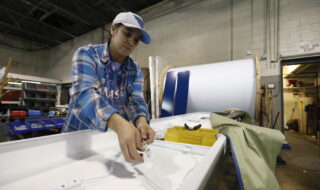July 9, 2025
Budget Deal Includes Big Wins, Big Changes for Small Business
After a dramatic finish to the New Hampshire Legislature’s 2025 Session in late June, the state has a new two-year budget and a host of new laws to sort through.
The budget is comprised of two bills: one that sets funding levels (HB 1) and another that specifies how money is spent and enacts policies (loosely or closely) related to the spending (HB2). The latter bill is commonly referred to as the “Budget Trailer.”
The bills sailed through the New Hampshire Senate on 16-8 votes but faced a rockier path in the New Hampshire House. There, the budget agreement moved forward with only a few votes to spare (185 yes – 180 no) while the Budget Trailer agreement was adopted by a single vote.
Speaker of the House Sherman Packard, who as the presiding officer normally does not vote, broke a 183-183 tie to send the latter bill to Gov. Ayotte’s desk.
Budget Numbers. The budget agreement for Fiscal Years 2026-27 spends $15.9 billion in total funds. This includes $6.16 billion in general and education funds, which are primarily fueled by state taxes. About a third of the state budget comes from federal funds.
State tax revenue projections, especially for the primary business taxes, were a sticking point between Governor Ayotte and lawmakers throughout the budget process.
Entering final budget negotiations, the House and Governor were roughly $500 million apart on general and education fund spending, with the Senate about halfway between them. Much of the gap was driven by different expectations for Business Enterprise Tax (BET) and Business Profits Tax Revenue (BPT).
Entity: FY 26-27 Total Gen/Ed; FY26-27 Total Biz Taxes
Governor: $6.4 billion; $2.45 billion
Senate: $6.2 billion; $2.4 billion
House: $5.9 billion; $2.16 billion
Ultimately, the governor and legislators agreed on business tax revenue projections of $2.3 billion.
Governor Ayotte’s optimistic revenue projections may yet prove prescient. While business tax revenue ended FY 2025 12% below projections, they ended the fiscal year up $5.5 million over plan – and $10 million above collections in June 2024.
If business tax collections continue to come in ahead of trend
Key Wins for Small Business. During the session, NFIB NH regularly testified on legislation and worked to educate state lawmakers on the impacts to small business. Critically, small business owners like you weighed in directly with local lawmakers to protect Main Street from higher taxes and costly regulations.
NO Small Business Tax Hike. Governor Ayotte and legislative leaders kept their promise not to raise taxes on businesses, but that doesn’t mean some lawmakers didn’t try to stick Main Street with higher taxes.
One proposal would have rolled back all the business tax rate reductions (BET, BPT, I&D, Meals & Rooms) since 2015 – a $700 million tax increase over the next three years.
NFIB NH strongly opposed the tax hike, and it was decisively defeated by the New Hampshire House in a bipartisan vote of 345 to 27.
NO Workers Comp and Unemployment Insurance Payout Hikes. HB 542 would have increased the maximum weekly unemployment payout from $427 to $669 – a 57% bump! HB 744 would have raised the weekly payout for most workers’ comp claims from 60% to 66 2/3% – an 11% increase. These proposals would increase small employer costs and keep workers on the sidelines longer – bad news for small businesses.
NO Vacation Payout Mandate. HB 378 would have required employers with 15 or more employees to pay out unused vacation time or PTO upon separation from employment when the business closes, changes ownership, or there is a “reduction in force.” This is an unfunded mandate that, even if interpreted narrowly, would add strain in times of financial distress and could reduce the value of a business.
NO New Healthcare Tax or Expensive Mandates. A proposal in the New Hampshire Senate budget would have imposed a new tax on fully insured and self-insured coverage. The entire proposal was deeply flawed, which we addressed in an op-ed published by NH Journal during final budget negotiations.
Working with coalition partners in the business community, we were successful in defeating this tax hike.
Two very expensive health coverage mandates were also defeated in the budget negotiations:
– Adult Prosthetics: medically necessary prosthetics (unlimited) and activity-specific prosthetics (1 per 5 years). Current law only requires coverage of prosthetics for those 18 years or younger. This would have cost commercial plan sponsors at least $12 million per year.
– Biomarker Testing. Potentially important but very expensive tests that make sense based on family history. The Senate budget proposal would have resulted in an even larger price tag than the prosthetics mandate.
Challenges for Small Business. While the budget largely contains good news for small businesses, the final deal still presents challenges for Main Street.
Parental Time Off Mandate. An amended version of the suite of proposals known as Momnibus 2.0, sponsored by Sen. Denise Ricciardi (R-Bedford). This includes a mandate for businesses with 20 or more employees to provide 25 hours of unpaid time off for pregnancy, childbirth, and postpartum care.
While NFIB NH worked to eliminate the most harmful aspects of the initial proposal – including unlimited time off at businesses of all sizes and expansive post-leave reinstatement rights – the final product is a disappointment. It still interferes with workforce management and contains
NFIB NH will continue to educate lawmakers about the harms that employment mandates cause for small businesses.
Fee Increases. The final agreement included a range of registration and license fee increases that impact small businesses, especially those in trucking, transportation and agriculture, albeit at much lower levels than what was initially proposed.
For instance, the House budget proposed increases to heavy-duty trucks, truck-tractors and trailers between 40% and 350% depending on the weight. The final agreement included fee increases for these vehicles of 10% to 20%.
In debate, lawmakers argued that increases were justified because many had not been raised in decades.
Pension Benefits Battle. The final week of budget negotiations was marked by contentious negotiations over funding for police and firefighter pensions (referred to as “Group II”).
During her campaign and in her first budget, Governor Ayotte proposed restoring benefit limitations imposed in 2011 on a subset of Group II employees who were not fully vested in their pensions at that time. The 2011 reforms were intended to improve the financial health of the state’s retirement system and limit taxpayer exposure to unfunded pension obligations.
The changes proposed by Governor Ayotte were estimated to cost about $250 million over ten years. Legislative budget negotiators initially limited funding to $150 million. The governor promised to veto the budget if the agreement was not improved.
Ultimately, lawmakers and the governor agreed to roll back some limitations on these employees. Most notably, the compromise allows these workers to “spike” their pension by including payout of unused holiday/vacation time (not sick time) but tempers this by basing the pension benefit on a five-year compensation average instead of three years. The agreement also raises the limit on annual benefits from $125,000 per year to $145,000 per year.
The Josiah Bartlett Center for Public Policy fully recaps the Group II legislative debate here and final agreement here.
Vehicle Inspections Eliminated. Perhaps no piece of the budget was as crucial to its passage in the House as the elimination of annual vehicle inspections. This provision kept many in the libertarian wing of the Republican caucus on board with the final deal.
Annual safety inspections are repealed effective January 2026. The timeline for full repeal of the emissions inspection requirement depends on approval from the federal government.
Auto dealers and repair shops largely opposed repeal, arguing that inspections are crucial to healthy cars and safe roads. Supporters of repeal argued that studies show annual inspections do not improve safety and that vehicles often fail for arbitrary or superficial reasons that unnecessarily cost drivers money.
Prior to repeal, New Hampshire was one of only 14 states to require annual safety inspections.
Increasing Housing Production. Speeding up the process and reducing the cost of building new housing was a key focus for lawmakers and Governor Ayotte this year. They passed a range of reforms aimed balancing respect for local zoning control with a desire to reduce red tape:
60-Day Permit Clock: A priority of the governor, the budget agreement includes language that requires a final decision on developers’ permit applications within 60 days and reduces the number of agencies that need to sign off from four to two.
Uniform Statewide Building Code: HB 428 prohibits local governments from adopting ordinances that are inconsistent with the state building code, providing more consistency and lower costs for home builders and buyers.
Multifamily in Commercial Zones: HB 631 requires municipalities to allow multifamily residential development in commercially zoned areas, subject to certain limitations.
Detached Accessory Dwelling Units (ADUs) by Right: HB 577 increases the size of ADUs that homeowners are allowed to build by right and expands the right to build ADUs to detached units subject to certain restrictions.
Third Party Inspectors: SB 188 allows third-party inspectors to approve new homes rather than waiting for government inspectors.
Single Stairwell: SB 282 allows residential buildings of four to six stories to have only one stairwell.
NFIB is a member-driven organization advocating on behalf of small and independent businesses nationwide.
Related Articles














